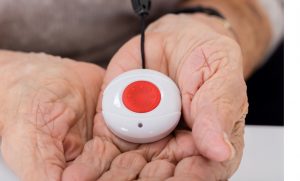If you live alone, or are often home alone during the day, you may worry about getting the help you need in the event of an accident or medical emergency. You may feel anxious about being able to reach your phone if you suffer a fall, or about remembering the right numbers to call to get help.
According to research from the Department of Veterans Affairs, older veterans who use the VA healthcare system face higher rates of disability and chronic illness than seniors who didn’t serve in the military. But after spending your career defending the nation’s freedom, you may feel fiercely protective of your own and want to enjoy your golden years on your own terms — independently, in your own home.
 Medical alert systems could help make this possible. Also called personal emergency response systems, these devices offer a convenient way for senior veterans to call for help in an emergency. With the simple push of a button, you can contact your loved ones or an emergency response dispatcher. As a veteran, you could get one of these devices for free.
Medical alert systems could help make this possible. Also called personal emergency response systems, these devices offer a convenient way for senior veterans to call for help in an emergency. With the simple push of a button, you can contact your loved ones or an emergency response dispatcher. As a veteran, you could get one of these devices for free.
This guide covers ways to get the free medical alert system you need to protect your independence. Keep reading to learn how to get a free medical alert system from the VA, plus other ways to get a free system, such as nonprofit organizations and state-funded programs.
Free Medical Alert Systems From the VA
The VA partners with two private companies to provide free medical alert systems to eligible veterans: Latitude USA and MedEquip Alert. Keep reading for more information about these options.
Latitude USA Alarms
Veterans could receive the Latitude Mobile Alert with Auto Fall Detection for free through the VA. This mobile alarm can be worn around your neck or on your belt.
If you need help, you can hold the device’s SOS button for 1 second, and the device then sends a text with your location to your emergency contacts and begins to call your contacts. You can talk to the first contact who answers. The device also has a side talk button you can use to quickly make an outgoing call to a single emergency contact.
Some key features of the Latitude Mobile Alert medical alert system include:
- Support for up to six emergency contacts, including 911
- Water resistant for use in the shower or rain
- Up to 5 days of battery life
- 4G LTE and Wi-Fi location positioning
- Built-in fall detection for added security
MedEquip Alert
The MedEquip Alert button, a mobile medical alert system, is available for free through the VA. This small device can be conveniently clipped to your belt or worn around your neck on a lanyard.
In an emergency situation, using the MedEquip Alert button is simple: Just press and hold the SOS button for 2 seconds. This connects you to an emergency operator who can either call one of your loved ones or dispatch emergency assistance. Some key features that could lead veterans to select this device include:
- 24/7 access to emergency operators
- Enhanced GPS that provides your location to emergency services
- Water resistant design for use in the shower or bath
- Uses wireless cellular AT&T LTE service, not a landline
- Up to 48 hours of standby power
- Optional fall detection functionality
- Optional lock box to help emergency services enter your home
How to Get a Free Medical Alert System From the VA

If you’re interested in getting a free medical alert system from Latitude USA or MedEquip Alert, the first step is to talk to your doctor at the VA. Discuss the reasons why you need a medical alert device, such as a fear of falling when you’re home alone, and ask your doctor for a VA-funded medical alert device.
Your doctor may prescribe one of the two medical alert devices and submit the appropriate documentation to the prosthetics department at the local Veterans Administration Medical Center. After this department approves the request, the order is sent to either Latitude USA or MedEquip Alert. The company may then contact you to arrange delivery of your new medical alert system. The device is usually shipped out in 24 – 48 hours.
Other VA Assistance for Medical Alert Systems
While the VA partners with Latitude USA Alarms and MedEquip Alert to provide free medical alert devices to veterans, you aren’t limited to those two options. If you have your eye on a different medical alert system, the VA may help you pay for it through the VA Prosthetic and Sensory Aids Service.
To get help paying for your preferred medical alert system, you can talk to your doctor at the VA. If your doctor agrees that you need that device, they can submit a request with medical justification to the prosthetics department. Another option is to call your local VA office to inquire about coverage for the device of your choice.
Other Ways to Get a Free or Low-Cost Medical Alert System
If you want a medical alert system, you may have options outside the VA. In the chart below, you’ll find some possible ways to get a free or low-cost medical alert system.
| Resource | Description |
|---|---|
| AARP | AARP (previously known as the American Association of Retired Persons) is a nonprofit organization that advocates for older adults. Senior veterans who have an AARP membership could receive discounts from some medical alert system providers. For more information about current AARP member benefits, call (888) 687-2277. |
| Medicare Advantage | Seniors who get their Medicare benefits through a Medicare Advantage (Part C) plan may have coverage for medical alert systems. These plans are offered by private insurance companies and may offer more benefits than traditional Medicare. Since coverage may vary from one plan to another, contact your insurer for more information. |
| Long-Term Care Insurance | Long-term care insurance policies help cover the services and supports seniors need to live independently at home. Some policies may reimburse seniors a set amount for a medical alert system. Senior veterans can contact their long-term care insurance provider or check their plan details for more information. |
| Private Insurance | Private health insurance policies, such as retiree coverage from a former employer, may help cover the costs of medical alert systems. Contact your insurer directly to find out if your plan offers this coverage. |
| Area Agencies on Aging | Area Agencies on Aging are a network of nonprofit organizations that help seniors access the resources they need to live independently. These agencies could refer you to local or state programs that provide free or discounted medical alert systems. Visit the Administration for Community Living website to find the AAA that serves your area. |
| Medical Alert System Providers | Many companies offer discounts to show their appreciation to veterans. If you have your eye on a specific medical alert device, consider contacting the company to find out if they have a special discounted rate for veterans. |
Free Medical Alert Systems: A State-by-State Guide
Senior veterans who need a medical alert system could receive financial support from their state’s Medicaid program. Many states offer coverage for assistive devices, such as medical alert systems. To learn which Medicaid waiver program may cover your medical alert device, find your state in the below chart. For details about the waiver, including eligibility requirements, contact your state Medicaid agency.
| State | Medicaid Waiver Program for Assistive Devices |
|---|---|
| Alabama | The SAIL Waiver covers the initial setup for a personal emergency response system, as well as monthly fees. |
| Alaska | Alaska’s Community First Choice Waiver covers personal emergency response systems. |
| Arizona | The Arizona Health Care Cost Containment System (Arizona Medicaid) covers personal emergency response systems. |
| Arkansas | ARChoices in Homecare covers a personal emergency response system with a call button in case of emergencies. |
| California | In participating counties, California’s Multipurpose Senior Services Program covers medical alert systems. |
| Colorado | The Elderly, Blind and Disabled Waiver includes an electronic monitoring benefit which could be used to install, buy or rent a medical alert device. |
| Connecticut | The Connecticut Home Care Program for Elders covers assistive technology. |
| Delaware | Delaware’s Elderly and Disabled Home and Community-Based Waiver Program offers coverage for a wearable emergency response system. |
| Florida | The Statewide Medicaid Managed Care Long-Term Care Program covers medical alert systems that rely on a home landline. |
| Georgia | The Community Care Services Program provides coverage for in-home medical alert systems. |
| Hawaii | Med-QUEST (Hawaii Medicaid) covers various long-term services and supports, including medical alert systems. |
| Idaho | Idaho’s Aid to the Aged, Blind, and Disabled Medicaid includes coverage for personal emergency response systems. |
| Illinois | Illinois Medicaid covers emergency home response systems for people aged 60 and older through the Persons Who Are Elderly Waiver. |
| Indiana | Indiana’s Aged and Disabled Waiver may help eligible seniors pay for personal emergency response systems. |
| Iowa | Iowa’s Home and Community-Based Services Elderly Waiver covers both assistive devices and medical alert systems. |
| Kansas | KanCare (Kansas Medicaid) offers coverage for assistive technology and personal emergency response systems through the Frail Elderly Waiver. |
| Kentucky | The Home and Community Based Waiver may cover a medical alert system if it’s necessary for a senior’s health and safety. |
| Louisiana | Louisiana’s Community Choices Waiver provides coverage for assistive devices and in-home monitoring systems. |
| Maine | The Waiver for the Elderly and Adults with Physical Disabilities covers remote monitoring services, including medical alert systems. |
| Maryland | Three waivers may cover medical alert systems in Maryland: Community First Choice, Community Options and Increased Community Services. |
| Massachusetts | The Frail Elder Waiver includes coverage for cellular-based medical alert systems. |
| Michigan | Michigan Medicaid’s MI Choice Waiver Program covers personal emergency response systems. |
| Minnesota | The Elderly Waiver includes coverage for the purchase, installation and monitoring of medical alert systems. |
| Mississippi | The Assisted Living Waiver covers attendant call systems in licensed adult residential care facilities. |
| Missouri | Missouri Medicaid offers no coverage for medical alert systems, but its Aged and Disabled Waiver covers many other services that seniors might need. |
| Montana | Montana offers coverage for medical alert systems through two waivers: Big Sky and Community First Choice/Personal Assistance Services. |
| Nebraska | The Aged and Disabled Waiver covers a variety of personal emergency response systems for eligible seniors. |
| Nevada | Nevada’s Waiver for the Frail Elderly includes coverage for the installation and monitoring of landline medical alert systems. |
| New Hampshire | The Choices for Independence Program covers personal emergency response systems. |
| New Jersey | In New Jersey, the Managed Long Term Services and Supports or Personal Preference programs may cover medical alert systems. |
| New Mexico | New Mexico’s Centennial Care Community Benefit offers coverage for personal emergency response services. |
| New York | The Assisted Living Program and Community First Choice Option both cover medical alert systems. |
| North Carolina | The North Carolina Community Alternatives Program may help seniors with disabilities pay for medical alert systems. |
| North Dakota | North Dakota’s Medicaid Waiver for Home and Community-Based Services covers medical alert systems. |
| Ohio | PASSPORT, an Ohio Medicaid waiver, includes coverage for emergency response systems. |
| Oklahoma | SoonerCare (Oklahoma Medicaid) may cover medically necessary emergency response devices through the ADvantage Waiver. |
| Oregon | Oregon’s K Plan offers coverage for assistive devices seniors need to live independently, which could include medical alert systems. |
| Pennsylvania | Community Health Choices, a Pennsylvania Medicaid managed care plan, may cover medical alert systems and other assistive devices. |
| Rhode Island | The Global Waiver provides covers for both the installation and monthly service fees for medical alert systems. |
| South Carolina | Eligible South Carolina seniors may receive a medical alert system through the Community Choices Waiver. |
| South Dakota | The HOPE Waiver may cover landline emergency response systems. |
| Tennessee | Tennessee’s CHOICES program includes coverage for various devices that support independence, including medical alert systems. |
| Texas | The STAR+PLUS managed care program or Community First Choice waiver may cover emergency response services. |
| Utah | Utah offers two waivers that provide coverage for medical alert systems: the Aging Waiver and the New Choices Waiver. |
| Vermont | The Global Commitment to Health Waiver covers assistive devices and personal emergency response systems. |
| Virginia | Virginia’s Commonwealth Coordinated Care Plus Waiver offers coverage for assistive technology, which may include medical alert systems. |
| Washington | Both the New Freedom Waiver and Community First Choice Option cover assistive technology. |
| West Virginia | The Aged and Disabled Waiver helps cover monthly service fees for a landline-based emergency response system. |
| Wisconsin | Family Care and IRIS both offer coverage for personal emergency response systems. |
| Wyoming | Wyoming’s Community Choices Waiver covers medical alert systems for eligible seniors. |

